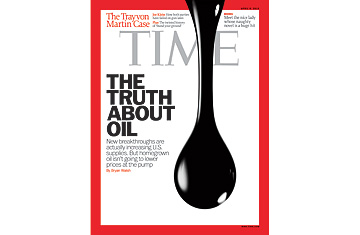
(4 of 6)
Brazil, with its deepwater resources, also looms as a friendlier and more secure dealer, something that has become all the more important in the wake of Arab Spring--related disruptions in oil-supplying countries like Libya. "We're seeing rapid and major changes in the geopolitics of oil," says Fatih Birol, chief economist at the IEA--most notably that the Americas, after years as oil customers, are poised to become sellers again.
So does that mean the return of $2-a-gal. gasoline? Nope. It's true that reducing oil imports is good for the U.S. economy. Americans spent $331.6 billion--the size of the entire agriculture industry--on oil imports last year, up 32% from 2010. Cutting imports keeps that money in the U.S., reducing a trade deficit that hit $560 billion last year. It's also, of course, good for international oil companies like Shell and Chevron, which are increasingly being squeezed out by massive state-owned companies. You may not like Exxon because of the pump price or its oversize profits, but how much love do you have for autocratic petrostates like Iran or Russia? Exxon's growth trickles down; the oil-and-gas industry created 9% of all new jobs last year, according to a report by the World Economic Forum, even as oil companies booked multibillion-dollar profits.
But contrary to what the drill-here, drill-now crowd says, oil companies could punch holes in every state and barely make a dent in gasoline prices. Even a more energy independent U.S. can't control prices, not with a thirsty China competing on the globalized oil market. "Energy security is fine, but it doesn't have that much meaning in a globalized economy," says Guy Caruso, a former head of the EIA. "More production adds fungibility to the world market, but we're still vulnerable to shocks in other countries." The oil the U.S. uses may be American, but that doesn't mean it will be cheap.
Boom and Bust
There is no substitute for oil, which is one reason it is prone to big booms and deep busts, taking the global economy along with it. While we can generate electricity through coal or natural gas, nuclear or renewables--switching from source to source, according to price--oil remains by the far the predominant fuel for transportation.
When the global economy heats up, demand for oil rises, boosting the price and encouraging producers to pump more. Inevitably those high prices eat into economic growth and reduce demand just as suppliers are overproducing. Prices crash, and the cycle starts all over again. That's bad for producers, who can be left holding the bag when prices plummet, and it hurts consumers and industries uncertain about future energy prices. Low oil prices in the 1990s lulled U.S. auto companies into disastrous complacency; they had few efficient models available when oil turned expensive.
The advantage of OPEC and especially Saudi Arabia, with its vast, easily tapped oil fields, is that producers could work together to manage prices, increasing production when demand rose and throttling back when prices were about to fall. It's not exactly the invisible hand at work, but the promise is more predictability, which helps consumers, producers and governments plan with confidence.
